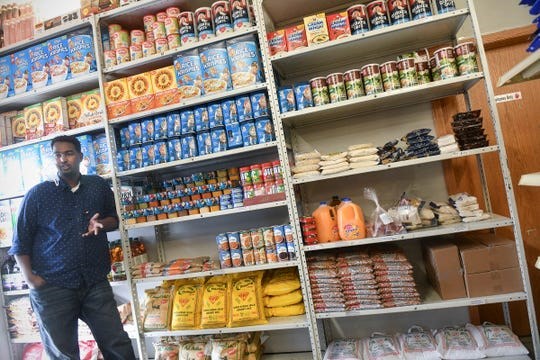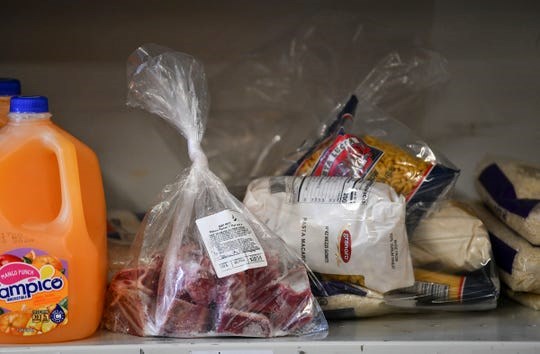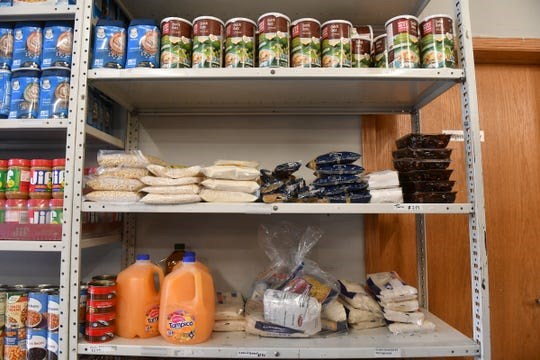
Thursday May 7, 2020

Noor Yussuf talks about packages of halal food available for those in need Monday, May 4, 2020, at Midnimo Grocery & Halal Meat in St. Cloud. (Photo: Dave Schwarz, [email protected])
ST. CLOUD — With assistance from some area organizations, a local grocery store has established a free grocery section to address food insecurity among St. Cloud's Somali residents.
Since April, economic hardships caused by the novel coronavirus pandemic have made putting halal food on the table more difficult for low-income Somali families in the St. Cloud community, said Serdar Mamedov, University of Minnesota Extension educator for health and nutrition programs.
To combat this, an emergency halal food supply has been established at Midnimo Grocery & Halal Meat in St. Cloud.
Mamedov worked with Community Grassroots Solutions, a Waite Park organization that works to improve the lives of refugees and immigrants, to apply for $550 in seed money from the Extension's Central Regional Sustainable Development Partnership, Mamedov said.The concept of halal is complex, but when it comes to food, it refers to both the animals themselves and how they are raised and slaughtered. Much of St. Cloud's Somali community is Muslim, and a halal diet is an important part of that, Mamedov said.
At a community food self, if a person is unaware of what ingredients are in a specific food item, they may be more cautious to take it.
At Midnimo, customers already trust offerings will be halal, store owner Noor Yussuf said. Approximately 90% of his customers are Somali, and, like a mom-and-pop-shop, are regulars.

Halal goat meat and a selection of other food items are available for people in need due to the COVID-19 crisis Monday, May 4, 2020, at Midnimo Grocery & Halal Meat in St. Cloud. (Photo: Dave Schwarz, [email protected])
Furthermore, the location is convenient. People already get their food there, Community Grassroots Solutions Executive Director Abdiaziz Odiriye said Monday. Having an emergency halal food supply at the store is a way to maintain dignity and privacy, and it's a chance to get extra food without being judged, Mamedov and Yussuf said.
Midnimo assembles packages of halal food that includes frozen halal meat, pasta, rice, dates, and canned and dry beans as well as a gallon of juice. The packages average about $45 in value, Yussuf said.
Customers can also choose to select only the free items they want or need rather than taking a whole package.
"We can see the challenges people are facing," Yussuf said.
His store has felt challenges as well. He would like to continue offering this option for those who need it, Yussuf said. He suspects his contributions to the project have already matched the provided funding.
"He's really committed to (serving) the low-income community members," Mamedov said of Yussuf.
Demand for emergency halal food was high earlier on, Yussuf said. Midnimo has given out 65 food packages since the program was implemented at the start of April, and he does not know how much he has given away in individual items designated part of the emergency halal supply. Meat is the most popular item.
Yussuf is also considering asking for donations to help sustain the project. Mamedov said one idea is customers with more financial stability could donate culturally acceptable food items when they shop in the store; for example, buying an extra bag of rice to go toward the emergency halal food supply.
Midnimo served as the program pilot, but Odiriye said he is expecting to receive more funding and expand the number of stores participating.

Food items for those in need are available Monday, May 4, 2020, at Midnimo Grocery & Halal Meat in St. Cloud. (Photo: Dave Schwarz, [email protected])
According to Mamedov, the system was well-received. He wants to help increase the role small, grassroots ethnic organizations can play in helping others and mobilizing their own resources — "telling them, 'You have the power to change this food environment.'"
There are at least 13 Somali-owned grocery stores in the greater St. Cloud area, Mamedov said.
"Let's think through this time how we can help each other," he said. "... Let's start from ourselves first."